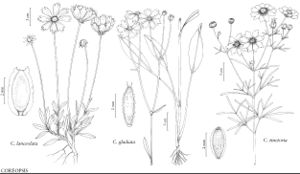Coreopsis gladiata
Fl. Carol., 215. 1788.
Perennials, 30–70 cm. Internodes (± mid stem) (1–)8–12+ cm. Leaves basal and cauline; usually alternate, sometimes opposite and alternate or all opposite; petioles 1–10(–15+) cm, not ciliate; blades elliptic or lanceolate to ± linear, (2–)4–8(–15+) cm × (3–)7–12(–40+) mm, sometimes with 1–2 lateral lobes. Peduncles (1–)4–8(–10+) cm. Calyculi of broadly deltate-ovate to lance-ovate or lance-linear bractlets 2–6+ mm. Phyllaries lance-ovate to lanceolate, 6–9(–12) mm. Ray laminae yellow, (12–)15–20+ mm. Disc florets 40–80+; corollas purplish or purple-tipped, 2.8–4.8 mm. Cypselae ± obovate to oblong, 3–4 mm, winged, wings 0.2–0.4+ mm wide, ± pectinate; pappi of 2 subulate scales 0.5–1+ mm. 2n = 26.
Phenology: Flowering ± year round, mostly Sep–Oct.
Habitat: Peaty bogs, swamps, depressions, in pine barrens
Elevation: 10–100+ m
Distribution

Ala., Ark., Fla., Ga., La., Miss., N.C., S.C., Tex., Va.
Discussion
As here circumscribed, Coreopsis gladiata includes plants that others (without agreement among themselves) have treated as distinct species and/or varieties: C. falcata (leaves mostly basal and/or proximal, alternate, blades mostly lance-linear to linear, often 1–2 with 1–2 lateral lobes, faces not dotted; outer phyllaries lance-ovate to lance-linear; Ga., N.C., S.C.); C. floridana (leaves mostly basal and/or proximal, alternate, blades mostly lance-linear to linear, not lobed, not dotted; outer phyllaries broadly deltate-ovate; Fla.), C. helianthoides (leaves mostly cauline, alternate, blades mostly elliptic to lanceolate, not lobed, faces not dotted; outer phyllaries lance-ovate to lance-linear; Ala., Fla., Ga., La., Miss., N.C., S.C.), and C. linifolia (leaves basal and cauline or mostly cauline, alternate or opposite or both, blades mostly lance-linear to linear, seldom lobed, faces bearing dark or translucent dots; outer phyllaries lance-ovate to lance-linear; Ala., Fla., Ga., La., Miss., N.C., S.C., Tex., Va.).
Selected References
None.
